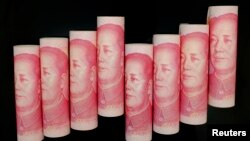WASHINGTON —
The Obama administration on Tuesday warned Beijing that it is concerned about the recent drop in China's currency, calling it “significantly undervalued” and saying it is watching the value of the yuan closely.
In a semi-annual report to Congress, the U.S. Treasury stopped short of declaring China a currency manipulator, but singled it out among large U.S. trading partners for its currency practices.
“Recent developments in the ... exchange rate would raise particularly serious concerns if they presage renewed resistance to currency appreciation and a retreat from China's announced policy of reducing intervention and allowing the exchange rate to reflect market forces,” the Treasury said.
The report noted that China's yuan - also known as the renminbi or RMB - rose in value last year, but it said the increase was too slow and did not go far enough.
“Factors indicate a RMB exchange rate that remains significantly undervalued,” it said.
Many U.S. lawmakers and businesses have long complained that China deliberately undervalues the yuan to gain an edge in international markets.
Echoing other recent statements, the Treasury welcomed a widening in the trading band that Beijing sets for the yuan, saying it presented an opportunity for markets to play a bigger role in determining the value of the currency, which Beijing has long kept on a tight leash.
The turn lower in the yuan this year, however, drew particular scrutiny in the report.
“China has continued large-scale purchases of foreign exchange in the first quarter of this year, despite having accumulated $3.8 trillion in reserves, which are excessive by any measure,” it said. “This suggests continued actions to impede market determination.”
The Treasury said the yuan has seen periods of depreciation before, but added: “The pace and the size of the recent decline was unprecedented.”
In a semi-annual report to Congress, the U.S. Treasury stopped short of declaring China a currency manipulator, but singled it out among large U.S. trading partners for its currency practices.
“Recent developments in the ... exchange rate would raise particularly serious concerns if they presage renewed resistance to currency appreciation and a retreat from China's announced policy of reducing intervention and allowing the exchange rate to reflect market forces,” the Treasury said.
The report noted that China's yuan - also known as the renminbi or RMB - rose in value last year, but it said the increase was too slow and did not go far enough.
“Factors indicate a RMB exchange rate that remains significantly undervalued,” it said.
Many U.S. lawmakers and businesses have long complained that China deliberately undervalues the yuan to gain an edge in international markets.
Echoing other recent statements, the Treasury welcomed a widening in the trading band that Beijing sets for the yuan, saying it presented an opportunity for markets to play a bigger role in determining the value of the currency, which Beijing has long kept on a tight leash.
The turn lower in the yuan this year, however, drew particular scrutiny in the report.
“China has continued large-scale purchases of foreign exchange in the first quarter of this year, despite having accumulated $3.8 trillion in reserves, which are excessive by any measure,” it said. “This suggests continued actions to impede market determination.”
The Treasury said the yuan has seen periods of depreciation before, but added: “The pace and the size of the recent decline was unprecedented.”





